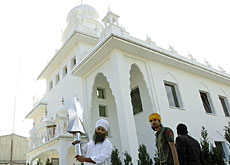
Integration through the eyes of believers

A Scottish church holding services in English and country-dancing evenings for homesick highlanders doesn't sound like the best way for foreigners to integrate.
But on a visit to the long-established Scots Kirk in Lausanne swissinfo found out that a foreign church can play a role in helping expats feel more at home in Swiss society.
The front doors of the tiny neo-gothic presbyterian church burst open and a wave of worshippers, young and old, black and white, pour forth. A small group of Africans bids farewell to Reverend Melvyn Wood as the chill Sunday wind gathers strength, while a number of families make their way to the nearby meeting rooms for a warming cup of tea.
The Scots Kirk was founded by the Church of Scotland in 1876 to serve the needs of Scots living in the Lausanne region according to the reformed Presbyterian tradition.
But names and appearances can be deceptive. Of the 200 members, only ten per cent are British and half of these are Scottish. The rest are mostly from the United States, Canada, Australia and South Africa, as well as from Asia and Africa.
“Scotland, although a small nation, has a tradition of being outward-looking and cosmopolitan. We have a responsibility not just for Scots but people in the Presbyterian tradition and other reformed faiths who can identify with what we do,” explained Wood.
And rather than reinforcing the sense of being separate, the minister is convinced the church plays an important role in helping English-speakers feel part of Swiss society. By not having to worry about the foreign language, worshippers are strengthened, more ready to participate in local culture, he said.
“People in the English-speaking community find a couple of things difficult to do in a foreign language: one is numbers – counting – and the other is praying,” he said. “But I don’t think people’s difficulties with expressing their faith in the local language reflect their integration attitude in general.”
And for expats keen to integrate, a church offers a great deal more than a simple sports club or association, he said.
“Faith goes deeper than any hobby; it’s part of your life. It forms your relationships and attitude to other people and how you live your life and that creates a very strong bond that sports clubs don’t create.”
Support network
As well as being a place of worship in English, the Scots Kirk provided a vital “surrogate family” support network, according to Canadian Gary Goodman, who has lived in Lausanne for over 20 years.
“It’s not necessarily helpful in terms of integration,” he admitted. “But it allows you to meet people from different walks of life and is a unique experience; people get together and help you out when you need it.”
British newcomer Katherine Furphy, who joined a Bible study group at the beginning of the year, echoed this sentiment.
“As a newcomer it can be very daunting if you have never lived outside Britain to settle in, even for things like going shopping; there is a lot of support from people in the church,” she said.
For church youth worker Jenny Replogle, who looks after 15 children and teens, many of whom were born in Switzerland, the church is essentially part of who they are.
“In lots of ways they are integrated, but they enjoy Church in English and having that one piece of their heritage and identity that remains the same,” she said.
Personal attitude
Apart from the weekly Sunday morning service and prayer groups, the Scots Kirk also organises social events such as art groups, concerts, an annual Burns supper to celebrate Scotland’s national poet, and Céilidh dancing evenings, which are “amazingly popular with the Swiss”, noted Wood.
Regular attender Christian Anner described the Scots Kirk as a “warm place” that “gives something back to the community”.
But he added: “Most people [here] are not integrated… but they don’t have integration difficulties. They are professionally privileged and most know how to communicate. I live in the Brazilian community where there are more difficulties.”
On the whole, newcomers seemed to agree that the church played a limited but still important role in an individual’s successful integration, which was ultimately a blend of personal attitude and circumstances.
“I think it depends on how adventurous you are and whether you speak the local language,” said Furphy. “My children go to the local kindergarten and schools, and that has helped us meet Swiss people. Otherwise, it’s very easy to stick with English people and expats.”
“It’s partly down to individual personality: how outgoing you are and how prepared you are to accept values and principles of another culture,” said Wood.
“It’s almost a cliché that the Swiss can be reserved and hard to get to know. I haven’t found that personally.
“But I reckon maybe there is some similarity been the Scots and Swiss, and maybe that’s why we’re one of the longstanding expat communities in Switzerland and have been more successful than others in integrating.”
swissinfo, Simon Bradley in Lausanne
The Scots Kirk Church in Lausanne, originally known as the Trinity Presbyterian Church, is one of two congregations of the Church of Scotland in Switzerland – the other is the Scots Kirk in Geneva.
The church building, designed in English neo-gothic style, was formally dedicated in 1877.
There are 13 Church of Scotland congregations in Europe. Lausanne has a membership of some 200 people, five per cent of whom are Scottish.
A 2000 census revealed that 41.8 per cent of Swiss people professed allegiance to the Catholic Church and 33 per cent supported the Protestant Church.
Presbyterianism is a form of Protestant Church government in which the church is administered locally by the minister with a group of elected elders of equal rank, and regionally and nationally by representative courts of ministers and elders.
Presbyterianism was first introduced in Geneva in 1541 under John Calvin in the belief that it best represented the pattern of the early church, and was taken to Britain by the Scottish religious reformer John Knox.
There are now many Presbyterian churches (often called Reformed Churches) worldwide. The Presbyterian Church is strongest in Scotland, but it is also well established in England, Wales, and the US.

In compliance with the JTI standards
More: SWI swissinfo.ch certified by the Journalism Trust Initiative






































You can find an overview of ongoing debates with our journalists here . Please join us!
If you want to start a conversation about a topic raised in this article or want to report factual errors, email us at english@swissinfo.ch.